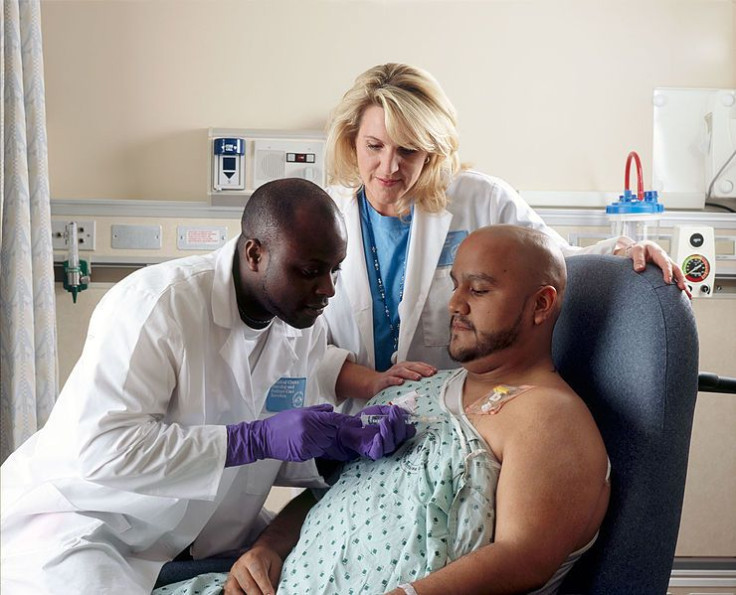For Vulnerable Elders, Nurse Practitioner-Physician Teams Deliver Better Care Than Doctors Alone

The complexity and incidence of chronic conditions afflicting the elderly has far outstripped the capacity of physicians to tackle them alone. A national shortage of geriatricians has the country turning to professionals trained in other disciplines — pharmacists, nurses, nurse practitioners, and physician assistants — to address the healthcare needs of an aging U.S. population.
It's not the case that delegating care from physicians to other professionals results in second-rate treatment. In the case of nurse practitioners (NPs), it's exactly the opposite. A recent study led by Dr. David Reuben, director of geriatrics at UCLA, and published in the Journal of American Geriatrics Society shows that patients co-managed by a nurse practioner and a primary care physician together were more likely to receive the recommended care than those seen by a doctor working independently.
Teams Are More Likely To Deliver The Recommended Care
The study followed the referral and treatment of 485 patients over age 75 deemed to have more than one of four conditions: urinary incontinence, risk for falls, depression, and dementia. The patients were seen in two primary care practices and randomly assigned to see a doctor only, or a NP-doctor team.
Patients who managed jointly by an NP and doctor were significantly more likely to receive recommended care, as outlined by evidence-based practice recommendations titled Assessing Care of the Vulnerable Elders, or ALCOVE-2 for short.
Patients screening positive for dementia received 59 percent of the recommended care NP-doctor teams, compared to 38 percent from physicians alone. Similarly, patients treated for falls received 80 percent of the recommended care from NP-physician teams, compared to only 34 percent from physicians alone. When treating patients with incontinence, co-managing with nurse practitioners led to 66 percent of recommendations followed, compared to only 19 percent when treated by physicians alone.
For depression, patients received equal care between the, doctors and doctor-NP teams, all receiving 60-63 percent of the recommended care.
The Difference Between Nurse Practitioners' And Doctors' Approaches to Care
The ALCOVE-2 recommendations, along with prevailing medical wisdom, suggest that treatment extend beyond prescribing a pill, but incorporate education about behavioral changes. Demands on physicians' time lead them to resort to quick fixes, while nursing education emphasizes sitting down and teaching the patient about lifestyle changes.
The results illustrate the difference: 95 percent of patients with incontinence who saw the NP-doctor teams were given instruction on non-drug approaches, such as Kegel exercises, which strengthen the pelvic floor muscles and lessen urinary incontinence. Meanwhile, patients with incontinence who saw physicians only received little to no instruction.
"Its been shown over and over that [non-drug approaches are] at least as effective and without the side effects," Reuben told The New York Times.
According to Reuben, the nurses' advantage in addressing problems is inherent; It's their job to address these common complications of aging, and nurses generally have more time to sit with patients.
Challenges To Implementing The NP-Doctor Team Approach
About 61 percent of the original 1,084 patients screened had a condition requiring attention, yet a third of these never received the proper referral. Physicians participating in the study hesitated to refer patients to nurse practitioners, and nurse practitioners often saw patients without a referral. This study is not the first to highlight the challenges of adopting a team approach to care.
Similarly, Reuben's study is not the first to highlight the benefits of the team approach. Other research shows that nurse practitioner-doctor partnerships provided better support for patients with congestive heart failure and type 2 diabetes. Despite the evidence, resistance to expanding the role of nurses remains, leaving some proponents of team approaches wondering when, or if, change will occur.
"When are we going to learn to acknowledge and appreciate the skills and abilities of each member of the healthcare team?" Dr. Barbara Reznick writes in an accompanying editorial. "When are we going to learn and believe in the benefits of a team approach?"
Sources: Reuben DB, Ganz DA, Roth CP, McCreath HE, Ramirez KD, Wenger NS. Effect of nurse practitioner comanagement on the care of geriatric conditions. J Am Geriatr Soc. 2013.
Resnick B. When will we ever learn the benefits of teams? J Am Geriatr Soc. 2013.



























